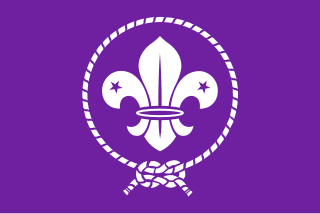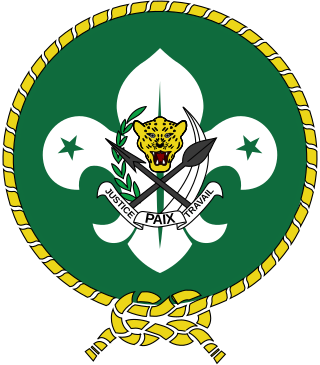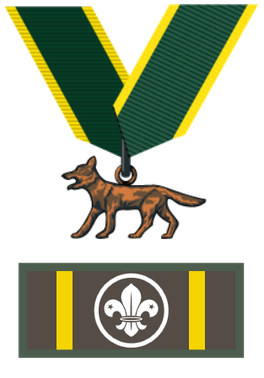
The World Organization of the Scout Movement is the largest and, after the Order of World Scouts, is the second-oldest international scout organization, having been established in 1922. It has 176 members. These members are national scout organizations that founded WOSM or have subsequently been recognised by WOSM, which collectively have around 43 million participants. Its operational headquarters is in Kuala Lumpur, Malaysia while it is legally based in Geneva, Switzerland.
The Scout movement in France consists of about 80 different associations and federations with about 180,000 Scouts and Girl Guides. Next to Germany, France is the country with the most fragmented Scout movement.

The Scout Promise is a spoken statement made by a child joining the Scout movement. Since the publication of Scouting for Boys in 1908, all Scouts and Girl Guides around the world have taken a Scout promise or oath to live up to ideals of the movement, and subscribed to a Scout Law. The wording of the Scout Promise and Scout Law have varied slightly over time and from country to country. Although most Scouting and Guiding organizations use the word "promise", a few such as the Boy Scouts of America tend to use "oath" instead.

The Republican Scout Association of Belarus is one of several nationwide Scouting associations in Belarus. It is the body recognized by the World Organization of the Scout Movement from 1998 to 2004 and again from September 5, 2010.

The European Scout Region is one of five geographical subdivisions of the World Organization of the Scout Movement, headquartered in Geneva, Switzerland, with a satellite office in Brussels, Belgium.

Gidsen- en Scoutsbeweging in België (Dutch) or Guidisme et Scoutisme en Belgique (French) (GSB) is the national Guiding and Scouting federation in Belgium. Scouting in Belgium started in 1911, and Guiding followed in 1915. The Belgian Scouts were among the charter members of the World Organization of the Scout Movement (WOSM) in 1922, and the Guides were one of the founding members of the World Association of Girl Guides and Girl Scouts (WAGGGS) in 1928. The federation counts 121,600 Scouts and 59,268 Guides.

The Fédération Burkinabé du Scoutisme, the national federation of two Scouting organizations in Burkina Faso, was founded in 1943, and became a member of the World Organization of the Scout Movement in 1972 under the name of Upper Volta. The coeducational Fédération Burkinabé du Scoutisme had 9,398 members as of 2011 and 7,644 as of 2021.

The Association des Scouts du Burundi, the national Scouting organization of Burundi, was founded in 1940, and became a member of the World Organization of the Scout Movement in 1979. The coeducational Association des Scouts du Burundi has 104,874 members as of 2021.

The Fédération des Scouts de la République démocratique du Congo (FESCO), the national federation of eleven Scouting organizations of the Democratic Republic of the Congo, was founded in 1924, and became a member of the World Organization of the Scout Movement (WOSM) first in 1963 and again in 1981. The coeducational Fédération des Scouts de la République démocratique du Congo has 71,486 members as of 2010.

The Central African Republic is one of 29 countries where Scouting exists but where there is no National Scout Organization which is a member of the World Organization of the Scout Movement at the present time. Scouting was founded in French Equatorial Africa in 1941, and was first recognized in 1969. The Fédération du scoutisme centrafricain, or FESCA, is the national federation of seven Scouting organizations. While FESCA was still recognized in 1990, there were 7,000 Scouts, and total membership at the end of 1998 was reported as being the same number.

The Association des Scouts de Djibouti is the national Scouting organization of Djibouti.

The Rwanda Scouts Association is the national Scouting organization of Rwanda. Scouting in Rwanda was founded in 1940 and became a member of the World Organization of the Scout Movement (WOSM) in 1975. The coeducational association has 18,884 members.

The World Organization of the Scout Movement (WOSM) Bronze wolf award is awarded by WOSM for "outstanding service by an individual to the World Scout Movement".

The Fédération Nationale des Eclaireurs et Eclaireuses du Luxembourg is one of Luxembourg's Scouting and Guiding organizations. It is a member of the federation Scouting in Luxembourg.
The Scout Movement in Spain consists of about 30 independent associations, most of them active on the regional level. Due to the regionalisation of Spain, even the larger nationwide associations are divided into regional sub-associations with individual emblems, uniforms and Scout programs.
The Scout and Guide movement in Albania is served by

The World Organization of the Scout Movement (WOSM) Scouts of the World Award is available to Scouts and non-Scouts. It was introduced in 2005 to give "young people more opportunities to face the challenges of the future", as identified by the United Nations Millennium Declaration in 2000 which identified eight Millennium Development Goals, and helps participants work towards those goals.

The International Catholic Conference of Scouting (ICCS) is an autonomous, international body committed to promoting and supporting Catholic Scout associations and to be a link between the Scout movement and the Catholic Church. Its headquarters is located in Rome, Italy.















